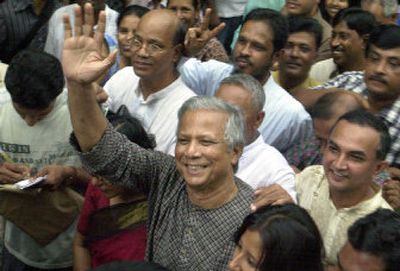Pioneer in ‘microcredit’ wins Nobel Peace Prize

CHITTAGONG, Bangladesh – Muhammad Yunus, Bangladesh’s “Banker to the Poor” who provides loans to help millions of people fight poverty by starting businesses, has won the Nobel Peace Prize.
Yunus, who shared the $1.4-million prize Friday with the Grameen Bank that he founded 30 years ago, pioneered the concept of “microcredit.” It allows very poor people, who don’t qualify for traditional loans, to get loans of as little as a few dollars without collateral. The banks’ shareholders are the impoverished people it supports.
Yunus, 65, and his bank were honored for “their efforts to create economic and social development from below,” announced the Norwegian Nobel Committee in Oslo, Norway.
As his jubilant nation cheered, Yunus told reporters in the capital of Dhaka that he wants “to work to create some more new things in the world” and would use the award money to start a company to produce inexpensive yet nutritional food for poor people and set up an eye hospital to treat impoverished patients.
Yunus said winning made him “feel more encouraged” about developing other “poverty alleviation” projects. He said he hoped “many countries will follow us” with programs to fight poverty.
In Oslo, the Nobel committee said “lasting peace cannot be achieved unless large population groups find ways in which to break out of poverty.
“Microcredit is one such means,” the committee said in a statement. “Development from below also serves to advance democracy and human rights.”
The Nobel shines a spotlight on a form of “social capitalism” that has gained currency in recent years, propelled by high-profile supporters like former President Clinton, rock star Bono and Microsoft founder Bill Gates.
In August, Gates’ foundation gave Yunus’ Grameen Foundation $1.5 million for a program to extend its microfinance programs to 5 million more of the world’s poorest families. Three years ago, tech entrepreneur Craig McCaw provided $2 million to start up the Grameen Technology Center, which is using microcredit to finance cheap mobile service for people in Uganda and Rwanda.
Yunus’ “revolutionary” belief that the world’s poorest people were not only good credit risks but potentially big business has led to the creation of a multibillion-dollar microcredit industry that is now being courted by government leaders and investment banks eager to replicate Bangladesh’s success.
“I’ve always said he’s the closest I will ever come to meeting Gandhi. He’s simply unmoved by any obstacle or any argument,” said Bill Clapp, an heir to the Weyerhaeuser fortune and founder of Global Partnerships, a Seattle-based microfinance group that has partnered with Grameen in Central America.
Across the globe, more than 92 million poor people, the majority of them women, have taken loans as small as $20 and worked their way out of the most dire poverty, said organizers of the Microcredit Summit Campaign, a public-private partnership whose sponsors include Monsanto and Northbridge Capital Corp.
Yunus, who was nominated for the peace prize at least twice before, is the first person to win a Nobel Prize from Bangladesh, a country of 147 million. His Nobel Prize is a rare bright light in a country struggling to defeat Islamic terrorists, and which is chronically inundated by floods and battered by storms that blow in from the Bay of Bengal. The country, formerly known as East Pakistan, is bordered by the Bay of Bengal, India and Myanmar.
The prize is named after Alfred Nobel, a pacifist and entrepreneur who invented dynamite in 1866. Nobel left much of his wealth to establish the award, which has honored achievements in physics, chemistry, medicine, literature and efforts to promote peace since 1901.
Yunus received his doctorate in economics in 1969 from Nashville, Tenn.’s Vanderbilt University, where he was a Fulbright Scholar. He became an assistant professor of economics at Middle Tennessee State University later that year, before returning to Bangladesh where he joined the economics faculty at Chittagong University.
Yunus’ Grameen Bank has more than 6.6 million borrowers, 97 percent of whom are women. The bank has 2,226 branches and provides services in 71,371 villages across Bangladesh. The bank has given out more than $5.7 billion in loans, in payments averaging $130, and claims a repayment rate of more than 98 percent. The banks’ borrowers make up about two-thirds of its depositors.